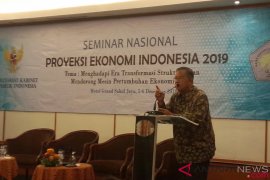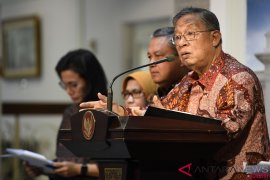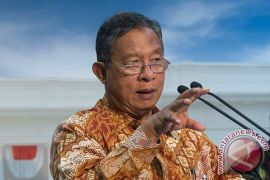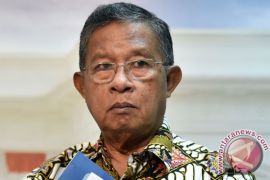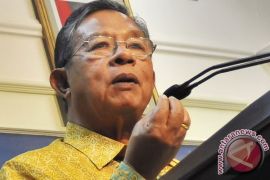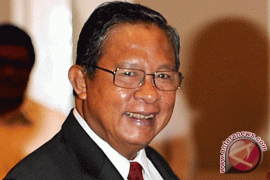Darmin said discussion on the ban on the use of Indonesian palm oil in Europe would be very crucial, adding the resolution is discriminatory and would hurt Indonesia.Jakarta (ANTARA News) - Coordinating Minister for Economy Darmin Nasution said he would visit Europe for talks with the European Parliament hoping to avert EU discrimination against Indonesian palm oil.
Indonesia has expressed deep disappointment with the EU Parliament approving last month a resolution banning the use of palm oil from Indonesia to feed bio fuel industry on allegation that expansion of oil palm plantations in Indonesia has resulted in extensive destruction of the countrys rein forests.
Darmin said discussion on the ban on the use of Indonesian palm oil in Europe would be very crucial, adding the resolution is discriminatory and would hurt Indonesia.
""The resolution is very discriminatory and unfair to Indonesia. The country does not deserve such treatment," Darmin said after a coordinating meeting of economics ministers here on Thursday on his planned visit to Europe by the end of July this year.
"The resolution is very discriminatory and unfair to Indonesia a treatment the country does not deserve," he said
Meanwhile, Industry Minister Airlangga Hartanto said Indonesia will explain to the EU parliament the management of the countrys palm oil commodities .
The discussion with the EU Parliament would also involve EUs chief executives that the ban as called for by the resolution is clear, Air langga said.
He said coordination with the EU parliament is important in seeking the conclusion of the Comprehensive Economic Partnership Agreement (CEPA) between Indonesia and the EU, as CEPA would need approval of the EU Parliament.
Last month, a delegation of the International Trade Committee Team of the EU Parliament visited Indonesia to see palm oil development in Indonesia. The team visited oil palm plantations in Riau and held meeting with government officials and Indonesian House of Representatives.
During its visit to the House of Representatives , the delegation gave clarification of the resolution that the "Report on Palm Oil Deforestation of Rain Forest" is not binding and is not legally effective.
The spokesman of the delegation of the EU Parliament Sajjad Karim said the delegation held meeting with the Indonesian government and stakeholders to iron out misunderstanding over Indonesian palm oil industry.
"It is clear , there has been misunderstanding that need to be straighten out from our perspective of palm oil industry in Indonesia. We hope this visit has given clarification from the EU point of view," Karim said.
Karim said he hoped the meetings and discussions could provide important basis for the conclusion of negotiation of Comprehensive Economic Partnership Agreement (CEPA) between Indonesia and the EU.
So far Indonesia has used certification of Indonesia Sustainable Palm Oil (ISPO) which is mandatory for all oil palm plantations although the standard has not been international recognized.
Industrialists have continued to keep themselves open to increasing the substance and utilization of ISPO in a bid to win international recognition especially from the EU, which is currently the second largest importer of Indonesian palm oil.
Indonesia, the worlds largest producer of palm oil, has been angered by the resolution that calls for ban on the use of palm oil from Indonesia
Palm oil businesses have urged the government to take strong action against the European Union, including retaliation, in response to resolution that they regard as detrimental to the local industry.
Indonesia Oil Palm Producers Association (Gapki) executive director Fadhil Hasan called for solid measures ranging from retaliation to termination of ongoing talks on a comprehensive economic partnership agreement (CEPA) with the 27-member bloc.
Fadhil said Indonesia could retaliate banning imports of goods such as wine, aircraft, perfume and pharmaceutical products from the region .
Several senior Indonesian officials have expressed their disappointment with the resolution. Environment and Forestry Minister Siti Nurbaya has described the resolution as an insult to the local palm oil sustainability scheme, the Indonesian Sustainable Palm Oil (ISPO).
Meanwhile, Agriculture Minister Amran Sulaiman described it as a black campaign against the domestic palm oil industry.
Indonesia and Malaysia, the worlds second largest palm oil producer, agreed to carry out a joint mission to meet EU officials to express their objections to the resolution and avert the implementation of the resolution.
Palm oil is one of Indonesias biggest export earners outside oil and gas with exports valued at US$18.23 billion or 13.8 percent of total exports of US$131.3 billion, last year.(*)
Editor: Heru Purwanto
Copyright © ANTARA 2017

